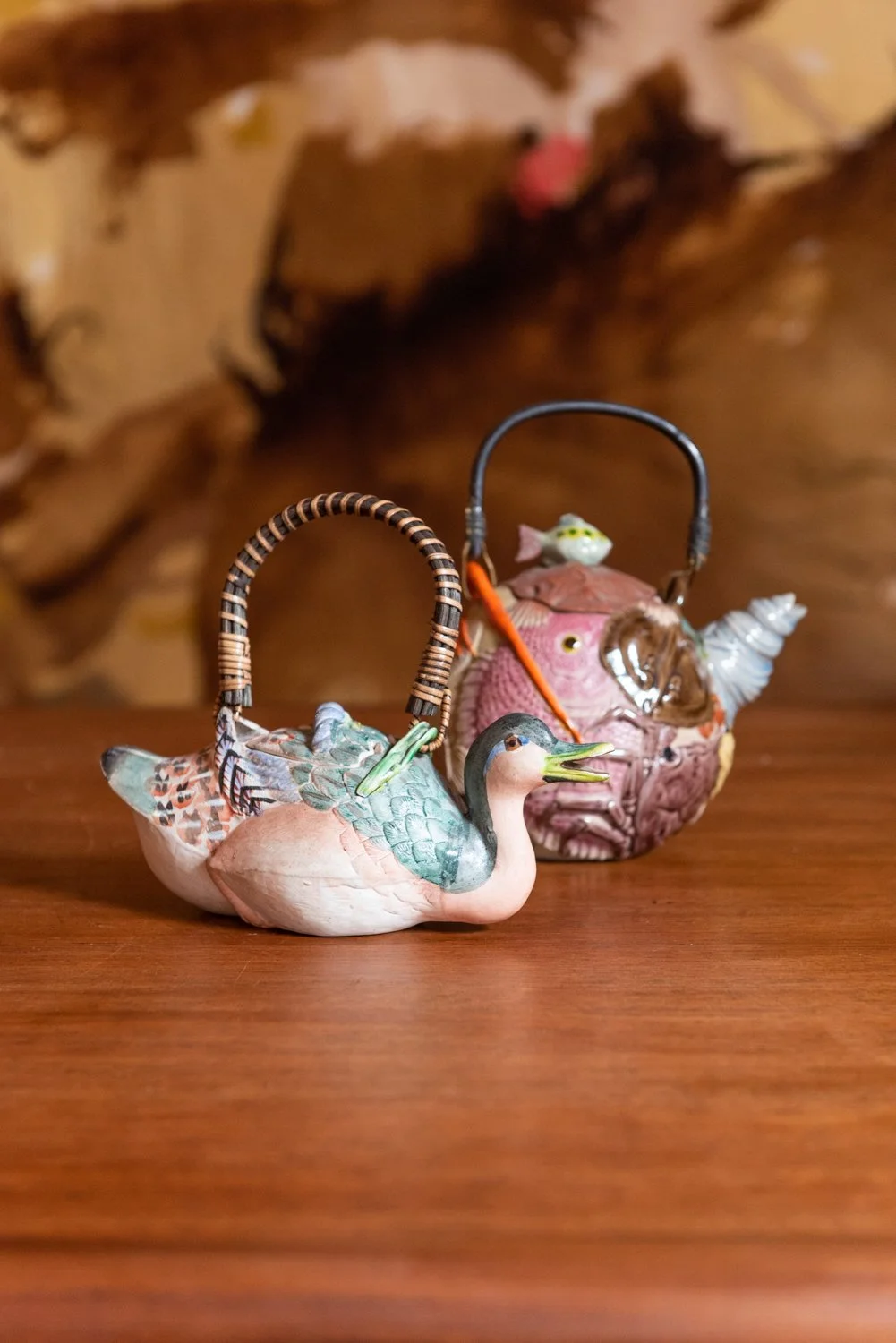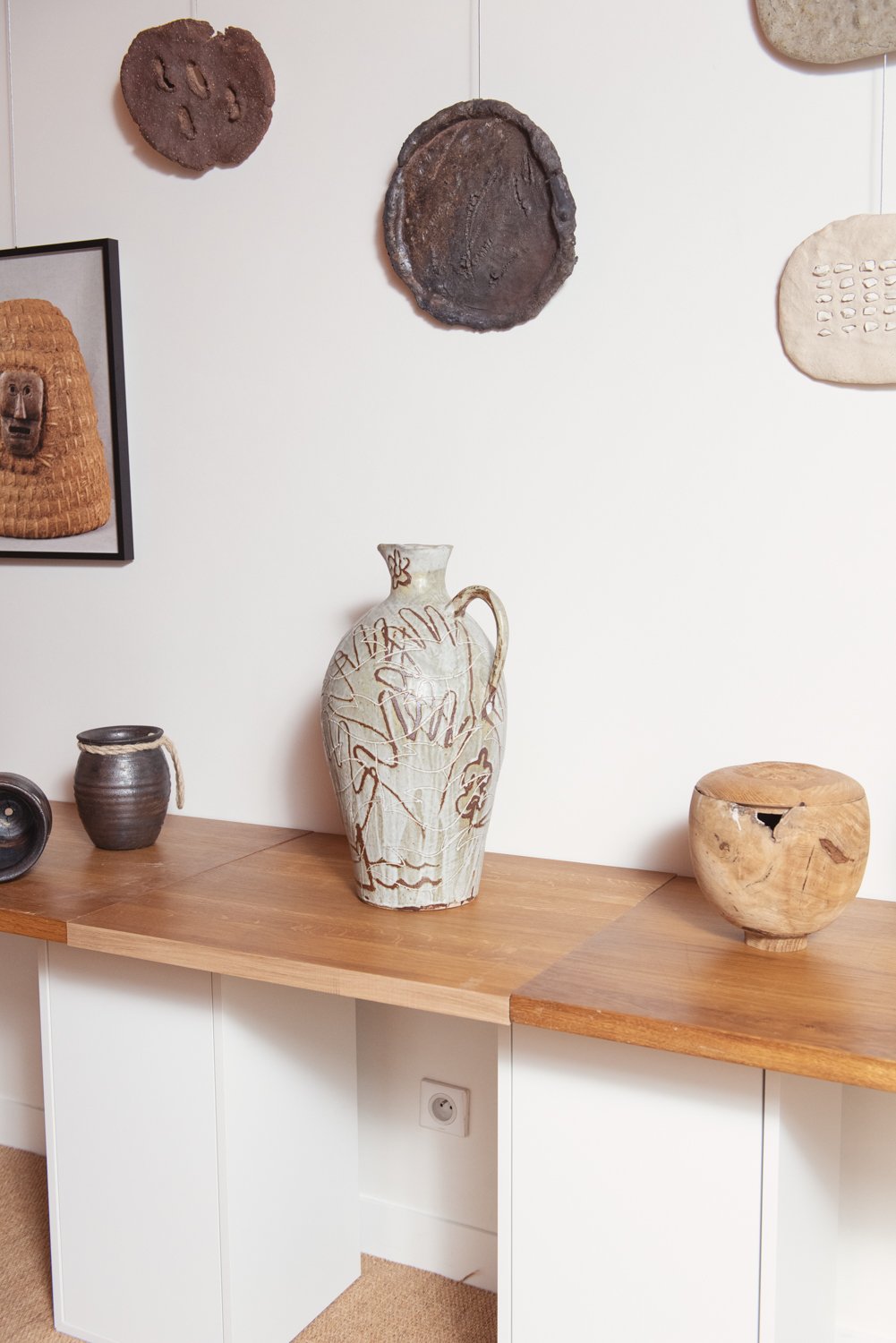Théière canard, Banko







Théière canard, Banko
Théière en forme de canard en faïence moulée et partiellement émaillée, filtre à l’intérieur
Banko yaki, Japon
Circa 1930
H x L x P cm
Excellent état, sans anse
Duck-shaped teapot in molded and partially glazed earthenware, filter inside
Banko yaki, Japan
Circa 1930
H x W x D cm
Excellent condition, without handle
La poterie Banko est un type de poterie japonaise originaire de Yokkaichi et son nom, contrairement à l’habitude de désigner une poterie de son lieu de fabrication, signifie éternité. L’ invention de ce style est celle d’un riche marchand nommé Nunami Rouzan à la moitié du XVIIIème siècle. Passionné par la Voie du Thé, il voulait créer sa propre poterie pour la dédier à cet usage. La principale catégorie de poterie Banko destinée à la Cérémonie du thé est celle dite Kyusu qui se rapproche stylistiquement de la poterie de grès chinoise de Yixing. Elle se distingue par la finesse et la sobriété, mais aussi par son aptitude à embellir grâce à une patine possible sur cette terre non émaillée au fil des utilisations.
Une autre raison expliquant sa large utilisation est la légèreté de ce type de poterie. Le corps, le bec, la poignée et le couvercle sont réalisés à partir de colombins d'argile très fins. C’est la technique dite kata-banko. La fabrication des théières sur des moules en bois qui s’imbriquent sur lesquels on applique la terre que l'on aplatit ensuite à l'aide de papier, donne des objets aux parois d'une finesse remarquable.
Ainsi de cette rare théière au canard. Ce décor au naturel est rendu très vivant grâce aux légères incisions de surface qui donnent un modelé raffiné évoquant tantôt le plumage pour cette pièce, tantot les écailles ou le pelage pour d’autres. Le rapport des volumes et de la couleur est déterminant dans la réalisation de ces pièces dont la maestria est remarquable en particulier dans certaines pièces du répertoire animalier telle que les poissons imbriqués ou le tigre rugissant déjà présentés ici.
Banko pottery is a type of Japanese pottery originating from Yokkaichi and its name, contrary to the habit of designating a pottery from its place of manufacture, means eternity. The invention of this style was made by a rich merchant named Nunami Rouzan in the middle of the 18th century. Passionate about the Way of Tea, he wanted to create his own pottery to dedicate it to this use. The main category of Banko pottery for the Tea Ceremony is the so-called Kyusu pottery which is stylistically similar to the Chinese Yixing stoneware. It is distinguished by its fineness and sobriety, but also by its ability to embellish thanks to a possible patina on this unglazed clay over the years.
Another reason for its wide use is the lightness of this type of pottery. The body, the spout, the handle and the lid are made from very fine clay lumps. This is the technique known as kata-banko. The manufacture of teapots on interlocking wooden molds on which the clay is applied and then flattened with paper, results in objects with remarkably thin walls.
Such as this rare duck teapot. This natural decoration is made very lively thanks to the light incisions of surface which give a refined model evoking sometimes the plumage for this piece, sometimes the scales or the coat for others. The relationship between volume and color is decisive in the realization of these pieces whose mastery is remarkable in particular in certain pieces of the animal repertoire such as the imbricated fish or the roaring tiger already presented here.










